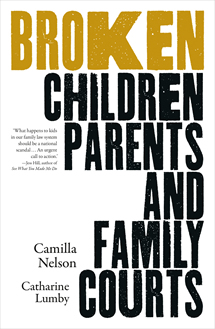Reviewed by Rama Gaind.
By Camilla Nelson & Catharine Lumby, La Trobe University Press, $32.99.
 “I’m sorry, but these are not legal problems.” This was a significant statement from a barrister as he explained to a distraught mother at the conclusion of yet another failed mediation.
“I’m sorry, but these are not legal problems.” This was a significant statement from a barrister as he explained to a distraught mother at the conclusion of yet another failed mediation.
In what is said to be the first in-depth book about Australia’s family court, the two professors in media shed light on a system that is fractured and neglects children across the country.
No system of law lacerates people’s lives like the family courts. This book, which takes children as its focus, is based on the work of many scholars, researchers and investigative journalists. And yet there are lacunas.
Broken reveals how the family courts – despite the high ideals on which they were founded – have turned into the worst possible place for vulnerable families and children.
There’s a “culture of the family courts” that this book sets out to investigate. In Australia, most separating families – 97 per cent – do not go to court, although 16 per cent use mediation, counselling and lawyers to settle their disputes. Broken considers what happens to the three per cent of separating parents who are compelled to use the courts as their main pathway to making children’s arrangements.
“The family courts are meant to protect and support children, but in reality the ‘best interests’ of children are often disregarded in favour of the ‘rights’ of their parents to see them, even in cases involving alleged sexual abuse.”
It’s a disturbing account of how Australia’s family courts fail children, families and victims of domestic abuse. Camilla Nelson and Catharine Lumby combine rigorous and impeccable research with heartbreaking stories of what it is like to experience the family court system in Australia.
Exploring the legal culture, gender politics and financial incentives that drive the system, the two academics point out it’s time we took a long hard look at how women and children are treated in family courts.











